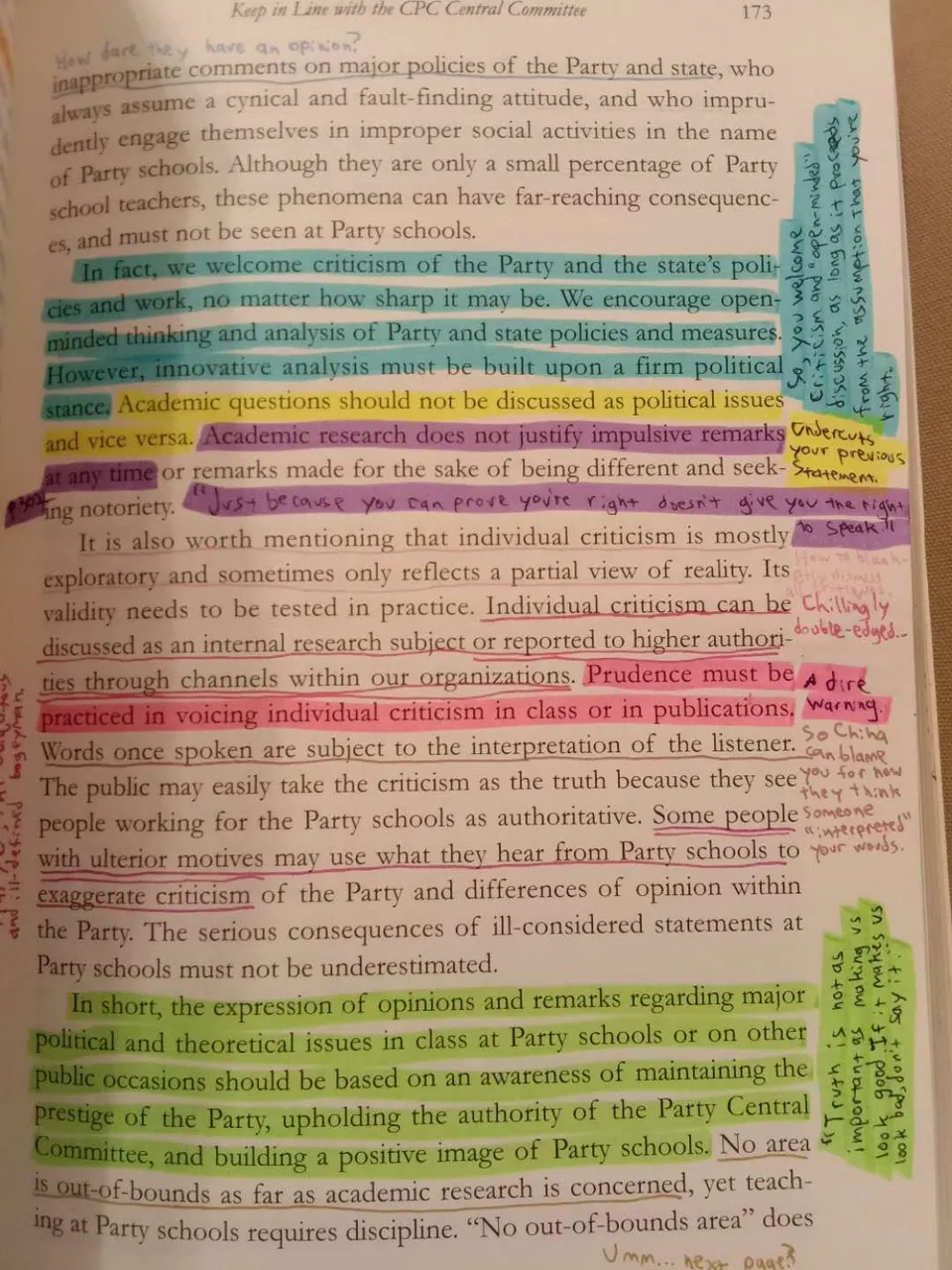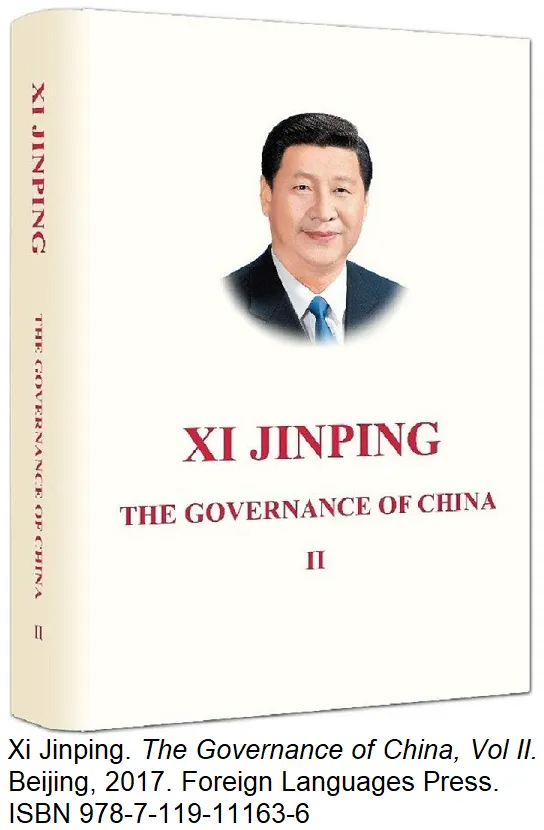I actually finished this collection of claptrap back in early November of 2019, right before starting on Rule of Law in China (which is little more than an echo-chamber reiteration of a section of this one, but I digress). I planned on reviewing it earlier but got sidetracked by my frustrated review of the above-mentioned, and my admittedly hubristic project of reviewing the Chinese epic Three Kingdoms. Then, as 2020 dawned, I found myself not even wanting to touch anything China-related.
But as the days since completing it dragged on and almost reached a year hence, I started to think "well, having already reviewed the first volume, both here and on Goodreads, I'd better get around to reviewing this brick before that so-blessed day when the Almighty finally allows me to contract Alzheimers and forget I ever read the damned thing."
But This Time... Shall Be Different!
"It's not different at all, is it, Steve?!" It's truly a sad state of affairs when a short at the beginning of a show like Aqua Teen Hunger Force can adequately sum up a 600 page book by a major world power's Head of State, but that is in fact the situation in which we find ourselves.
Page 1 bears no text except the subtitle of the first section: "Socialism with Chinese Characteristics and the Chinese Dream." Anyone who read Volume I remembers that one could almost make a drinking game out of the number of times per page both of these mind-numbing slogans were shoehorned in, and these all-too-familiar buzzwords are the very first words a reader encounters in Volume II. It's as if the ones who collected fragments of Xi's speeches and strung them together in what they clearly hoped was a coherent fashion to make this nonsensical tome were going out of their way to say "you've seen the opening credits of Return of the Killer Tomatoes, right? You remember, 'The theme song still remains the same, the plot itself has hardly changed! Our guaranteed path... to fortune and fame...' Yeah, this book is going to be like that... With Chinese Characteristics."
And let's take a look at the first paragraph of the first speech.
Great times make great people. Deng Xiaoping was a great and beloved man who arose from the historic struggles of the Chinese nation. His noble character remains fresh in the memories of many people who worked under his leadership and guidance. His lofty revolutionary ideals and charisma will always be an inspiration to us on our path towards the Two centenary Goals and the Chinese Dream of National Rejuvenation. (p.3)
Let's see. We've got a cliche Western proverb (which is misquoted) for an opener, a half-hearted homage to a previous leader, some forced appeals to "revolutionary ideals," and of course, right out of the gate, we have the trite and so-often repeated buzzwords "Two Centenary Goals" and, of course, "Chinese Dream of national rejuvenation." This time I kept count of how many times this phrase was dropped, and the final tally was 65, with the 64th and 65th repetitions appearing on page 574.
By this point it was already obvious that if a reader was expecting to see signs of the growth or maturation of Xi's view since the publication of Volume I, they were in for 600 pages of disappointment. Nothing about the man or his "vision (if you want to call it that)" for the self-anointed Central Nation has changed a bit.
Like Before, But More Desperate
If anything has changed between Volume I and Volume II, it's only that Xi, who showed all the signs of buying into his own delusions of supremacy before, seems to have sweat pouring off of his forehead this time around, fearful that "[the] Party will lose its right to rule and be eliminated by history (p. 44)." Not only is the second speech in the book rather brazenly entitled "CPC Leadership is Essential to Chinese Socialism," but also the largest section of the book, falling just short of 100 pages (151 - 248), is subtitled "Governing the Party with Strict Discipline." Take a look at the titles of some of the speeches quoted herein.
- "Keep in Line with the CPC Central Committee"
- "Stronger Discipline Inspection Tours Make for Stricter Party Self-Governance"
- "Party Leadership is the Unique Strength of SOE's"
- "Tighten Political Activities Within Our Party"
- "Reinforce the Party's Internal Scrutiny"
The atmosphere here is that of a charlatan preacher who fears that his cult is beginning to go astray from "the guidance of Marxism, a faith unshakable at all times and in all circumstances (p. 69)," so he's about to launch an inquisition to find heretics and get them to renew "the commitment and loyalty of [these] Communists to their faith (p. 35)."
Each of these speeches is a collection of stern and dire warnings to officials whom Xi feels are losing their "loyalty to the faith, to Party organizations, and to the Party's theories, guidelines, principles and policies (p. 208)." Again and again, Xi stresses the importance of submission to Party Doctrine and unquestioning obedience to the Central Committee.
Loyalty to the Party is an important criterion for county Party secretaries. There could be many more standards for evaluation, but loyalty is central, as "the greatest virtue is none other than loyalty." (p. 154)
Only with firm ideals and convictions, and only with loyalty to the Party can one build a sound base of political philosophy. (p. 155, emphasis added by reviewer)
First, we must uphold the authority of the Central Committee. All Party members, especially officials, must make sure their thinking, their actions, and their political stance all maintain a high degree of unity with the Central Committee, and follow its command at all times and under all conditions. (p. 168)
This last is followed up with a lengthy rant against "irresponsible remarks," which he rather flatly defines as any Party member daring to have any words other than glowing flattery for the CPC and its emperor. He even flatly declares that being well-researched and right does not justify the sin of criticizing the Party or its leadership (p. 173).

Further adding to this perception that the Chinese "flock" is going astray from the "Holy Communist Church," is the way the author never once mentions anything China has accomplished (or anything he claims they have accomplished) without forcing the phrase "under the leadership of the CPC" into it somewhere.
The People's Republic of China is prosperous and strong. It would not exist without the CPC. (p. 18)
It is readily apparent that without the leadership of the CPC, our country and nation (1) would not have made such great progress, nor would we have achieved such high international standing. (p. 20)
China's success hinges on our Party. The most essential feature of the socialist society with Chinese characteristics is the leadership of the CPC. (p. 43)
[A]bsolute CPC leadership over the army guaranteed victory on the battlefield. (p. 57)
Reform is part of our great struggle. To implement further reform, we must strengthen CPC leadership. (p. 113)
To strengthen our military, we must uphold the Party's absolute leadership over the military. (p. 452)
China has come this far because under the leadership of the CPC, the Chinese people have blazed a development trail that suits China's actual conditions. (p. 526)
The author is desperate to have it repeated as often as possible; "you are nothing without the Party... you are nothing without the Party... you are nothing without the Party..."
One must ask who he's trying to convince.
Doublethink With Chinese Characteristics
Of course, the book has its precursor's knack for flagrantly contradicting itself.
Concerning major issues, one should request instructions or report as required. No one is permitted to act beyond his or her authority without prior approval. (p. 169)
They [local officials] should investigate and handle problems promptly instead of always forwarding them to Party committees and commissions for discipline inspection. (p. 205)
Well, that explains why the Chinese government got caught with their pants down during the outbreak in December 2019. And of course...
We will enhance cooperation on cyber security, block the online transmission of audio and video materials instigating violence and terrorism. (p. 504)
We should respect the right of internet users to exchange ideas and express their minds. ( p. 584)
When you realize that China's definition of "terrorism" is (and has always been) anything challenging the authority of the Chinese State (p. 364), this becomes another hilariously contradictory example.
And of course, one of my personal favorite examples is when the book contradicts itself within a single sentence by stating "putting the State before your family shows good family values."
During the challenging first three decades of the PRC, Chinese people prioritized national interests over their family matters, which demonstrated their pursuit of family virtue. (p. 383)
This trend continues from beginning to end. Whether it is insisting that the PLA is "the People's Army (p. 453, 486)" while reminding it to unquestioningly obey not the People but the Party (p. 443, 452 and others), insisting China will never seek hegemony (p. 574) while calling on the world to hand China more "international responsibilities" (p. 502) so the self-anointed "Central Nation" can "provide proper guidance to Humanity (p. 368)," or swearing China will never interfere in the affairs of other countries (p. 562) while calling upon the media to redouble their efforts to do so (p. 362), the book seems at pains to contradict its own precepts as often as possible.
Then again, for anyone who has read any of China's propaganda (and God knows I've forced myself to read a lot of it), this is nothing new.
So... Should Anyone Read It?
If you want to have a clue what's going on in China, avoid this book like it came from a Wuhan market. Not only is it rather empty propaganda, but it's not even good empty propaganda. The only possible reason to read this would be if you are a China-watcher who read the first one (and if you are, I feel your pain). The change of tone that I mentioned between Volume I and Volume II is worth noting, as are the author's frequent (and grudging) admissions that China is not nearly as strong as they'd like the world to think. It's not so much that he admits anything we didn't already know, but the fact that he has been browbeaten to admitting it is very telling.
And of course, if you're a China expat, there's a certain status to be gained when some Chinese friend who's trying to get into the Party quietly confides to you over the dinner table that they are supposed to write a paper on their response to this book but haven't read it and you can look surprised and say "oh, I have. Want some help?"
But beware. Remember early in this review when I compared this book to Return of the Killer Tomatoes? Well, you'll want to finish listening to those opening credits before thinking this author is finally finished polluting the world with his drivel.
Sit back, 'cause now the show starts;
Part 2, of only two parts!
But if this [book] does well, you see, we're sure you know, predictably, it won't be long...
...until Part 3.
Indeed, God help us all.
(1) The words translated as "country" and "nation" here were '国' and '民族,' respectively, and Jacob Shapiro's commentary on the less-than-subtle racial subtext here seems to require little explanation.

